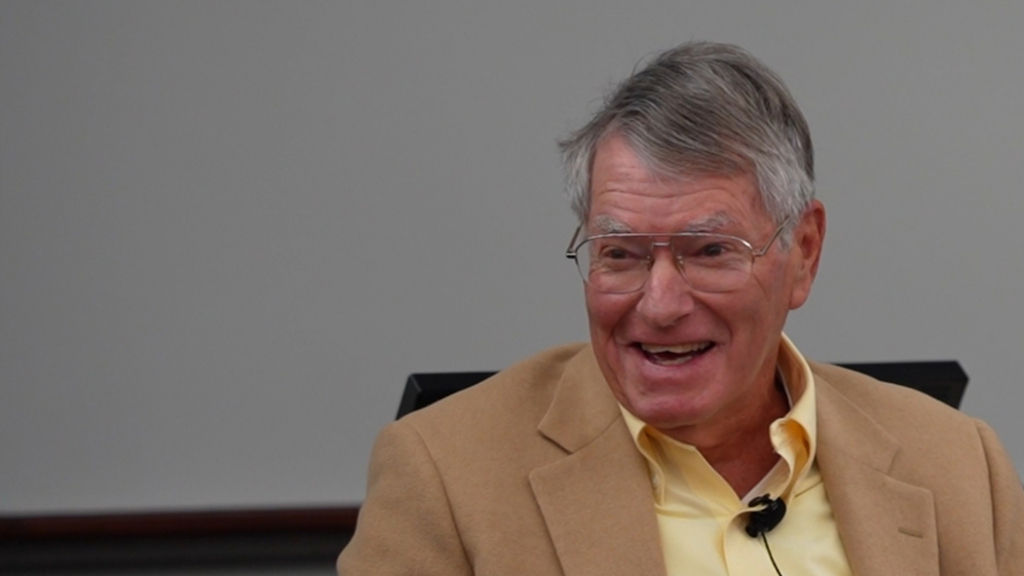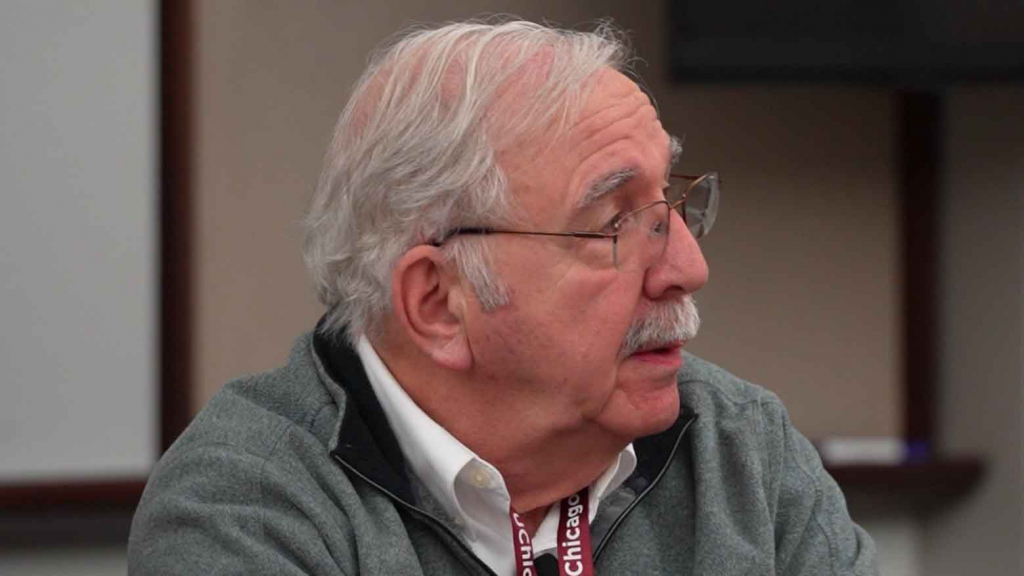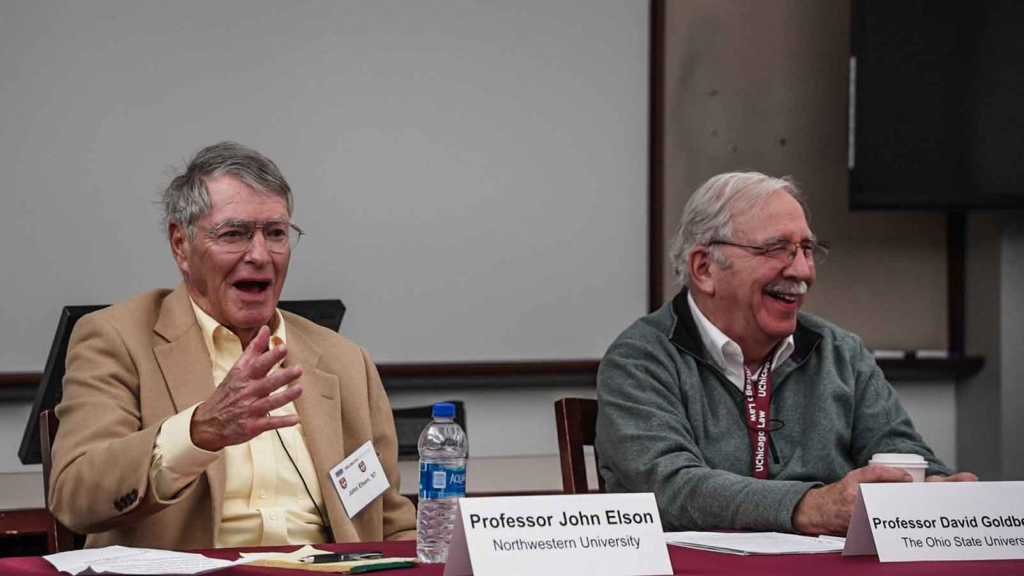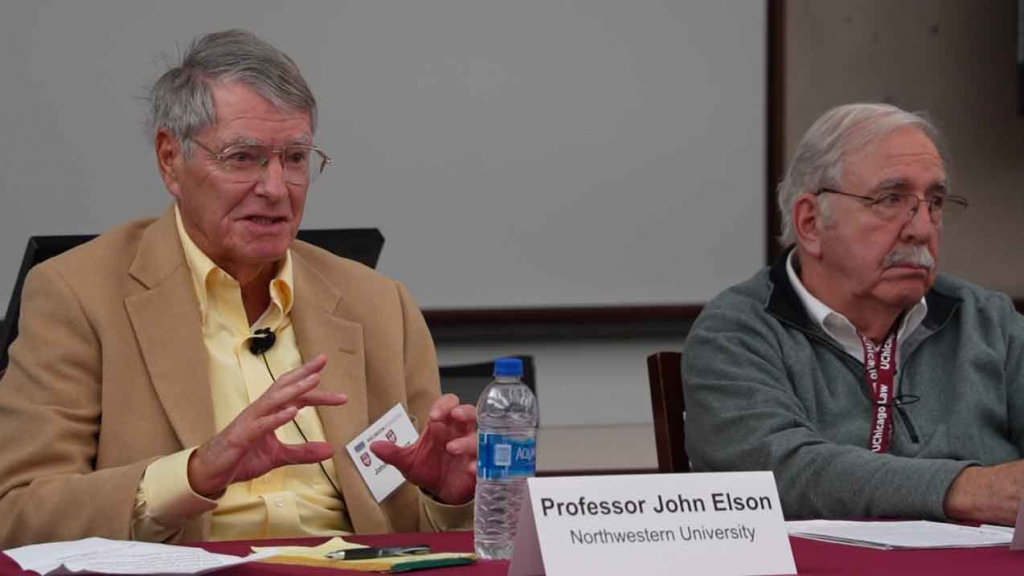In his opening remarks at the afternoon gathering with his classmates, David Goldberger talked in detail about the evolution of law school teaching as he experienced it in the the decades he spent teaching First Amendment law, Constitutional Law, and clinical law courses.
Not long after graduating in the Class of 1967, David took the position of Legal and Legislative Director of the American Civil Liberties Union, Illinois Division. His notable First Amendment ACLU battles in that role included famously representing the widely reviled National Socialist Party of America, a neo-Nazi group, when it sought to hold a demonstration in the heavily Jewish Chicago suburb of Skokie, Illinois. His years of practical litigation experience at all levels served him well when he later became a law professor at Ohio State University College of Law. While teaching, he continued his civil liberties work and later received the Norman Dorsen Presidential Prize prize from the Ohio ACLU for “a lifetime contribution to protecting our cherished fundamental freedoms.” The encomium that accompanied his award summarizes an extraordinary career in the law:
Professor Goldberger always knew he wanted to make a difference, but when he chose to attend the University of Chicago Law School, he could not have known the impact he would make on protecting First Amendment rights for everyone and the monumental effect the cases he argued would have on his life. Four cases in front of the United States Supreme Court, a number of civil liberties victories, and decades later, Professor Goldberger is still just as committed to protecting constitutional rights — even taking on pro bono civil liberties cases for clients unable to afford counsel.
Taking on Tough Issues
Early in his career, Professor Goldberger served as the Legal and Legislative Director for the American Civil Liberties Union, Illinois Division. He is most well-known for the 1977 case National Socialist Party of America v. Village of Skokie (obligating state courts to provide expeditious review of injunctions against public assemblies). The case began when nazis sent requests to several Chicago suburbs, including Skokie, seeking permits to hold a rally in their towns. While most towns ignored the request, Skokie banned the rally and put laws in effect that would ban most political rallies, not just the rally requested by the National Socialist Party.
The decision to represent the National Socialist Party was a wildly unpopular move as the suburb had a large Jewish population, including many Holocaust survivors. Professor Goldberger admits that this was the most difficult case of his career, but to this day he believes it was a critically important case to take. The case made it all the way to the Supreme Court of the United States, and by defending what many deemed to be highly unpopular speech, Professor Goldberger helped protect free speech for all of us. It took someone truly committed to the core of free speech rights to take on this case, and Professor Goldberger was unwavering in his belief that the ACLU should take cases to guard our freedoms — even when they aren’t easy.
Championing the First Amendment
After Skokie, Professor Goldberger continued to take on critical First Amendment cases and achieve crucial victories in front of the Supreme Court of the United States. In the 1980’s Professor Goldberger accepted a job at the Ohio State University College of Law and joined the ACLU of Ohio’s board of directors as general counsel. In this role, Professor Goldberger argued McIntyre v. Ohio Elections Commission before the Supreme Court of the United States in 1995 (invalidating Ohio statute prohibiting distribution of anonymous, non-libelous, campaign literature). Also in 1995, Professor Goldberger was co-counsel in Capital Square Review and Advisory Board v. Pinette. In 2005, Professor Goldberger successfully argued before the Supreme Court of the United States for the second time in the case of Cutter v. Wilkinson, safeguarding a federal statute protecting the right of prison inmates to freedom of religion.
Leading Expert on the Freedom of Assembly
Over the years, Professor Goldberger has remained steadfast in his belief that we all have an obligation to make a difference where we can. When he isn’t teaching classes or consulting on or taking cases as a volunteer attorney for the ACLU of Ohio, Professor Goldberger serves as one of ten experts on the Organization for Security and Cooperation in Europe (OSCE)/Office of Democratic Institutions and Human Rights (ODIHR) Panel on Freedom of Assembly. This role has taken Professor Goldberger to a number of different countries where he contributes to discussions on best practices for monitoring assemblies and how to combat obstacles to freedom of assembly. In addition, he reviews legislation related to the freedom of assembly, and presents on related subjects including the Handbook for Policing of Assemblies. Professor Goldberger also co-authored the Guidelines on Freedom of Peaceful Assembly which were issued in 2007 and endorsed by the European Commission for Democracy through Law of the Council of Europe (Venice Commission) in June 2008.
Professor Goldberger has dedicated his life to protecting our fundamental freedoms and has strengthened all of our rights through his high impact cases and resolute commitment to civil liberties.









